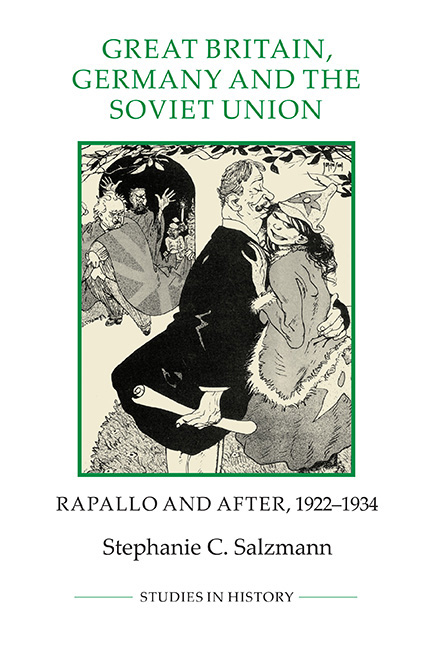Book contents
- Frontmatter
- Contents
- Acknowledgements
- Abbreviations
- Introduction
- 1 ‘It Nearly Overthrew the Applecart’: Lloyd George and the Treaty of Rapallo
- 2 ‘The Most Important Event Since the Armistice’: The Foreign Office and Rapallo
- 3 Rapallo's First Test: The Ruhr Crisis
- 4 The Policy of Conciliation: Rapallo and the First Labour Government
- 5 The Battle for the German Soul: Locarno and the Treaty of Berlin
- 6 Rapallo and the Rupture of Anglo-Soviet Relations
- 7 Rapallo and the Decline of the Locarno Spirit
- 8 An Economic Rapallo?
- 9 Rapallo and the Disarmament Conference
- 10 The Rapallo Relationship and Hitler's Rise to Power
- 11 The End of Rapallo: The German–Polish Non-Aggression Treaty
- Conclusion
- Bibliography
- Index
3 - Rapallo's First Test: The Ruhr Crisis
Published online by Cambridge University Press: 29 April 2017
- Frontmatter
- Contents
- Acknowledgements
- Abbreviations
- Introduction
- 1 ‘It Nearly Overthrew the Applecart’: Lloyd George and the Treaty of Rapallo
- 2 ‘The Most Important Event Since the Armistice’: The Foreign Office and Rapallo
- 3 Rapallo's First Test: The Ruhr Crisis
- 4 The Policy of Conciliation: Rapallo and the First Labour Government
- 5 The Battle for the German Soul: Locarno and the Treaty of Berlin
- 6 Rapallo and the Rupture of Anglo-Soviet Relations
- 7 Rapallo and the Decline of the Locarno Spirit
- 8 An Economic Rapallo?
- 9 Rapallo and the Disarmament Conference
- 10 The Rapallo Relationship and Hitler's Rise to Power
- 11 The End of Rapallo: The German–Polish Non-Aggression Treaty
- Conclusion
- Bibliography
- Index
Summary
By the end of 1922 the Rapallo agreement had retreated into the background of British attention. The months that had passed since the end of the Genoa conference were dominated by a number of issues which were more important to British foreign policy than the Russo-German treaty. Lloyd George had stepped down as British prime minister in October 1922 and was replaced by the Conservative Andrew Bonar Law in the November elections. Bonar Law confirmed Curzon as foreign secretary, and the Foreign Office gradually re-emerged from its backstage role under Lloyd George without, however, regaining its pre-war influence. The issues of greatest concern to British foreign policy in the last months of 1922 were undoubtedly the Greek–Turkish conflict and, to a lesser extent, the German reparation question. Curzon and Tyrrell left for the peace conference with Turkey at Lausanne in mid-November and did not return to London before beginning of February 1923. When, in early January, the Turks became increasingly obstinate in the negotiations, Crowe, the permanent under-secretary, was also summoned to Lausanne to assist Curzon in his attempts to persuade both the Turks and the French, who were supporting Turkey, to accept reasonable peace terms. More than once the Lausanne conference was on the verge of collapse, and the Anglo-French entente in severe danger. These developments did not facilitate Anglo-French communication on other foreign policy problems.
On 11 January 1923 French and Belgian troops invaded the Ruhr basin as a reprisal for the German failure to meet reparation payments. Britain knew of these French plans at least since Bonar Law and his French counterpart Poincaré had met in London on 9/10 December 1922. Poincaré had hoped to secure British support for an Allied occupation of the Ruhr to make Germany pay, and Bonar Law ‘had been unable to tell Poincaré openly of the damage which would be done to the entente by a Franco-Belgian occupation of the Ruhr’, ‘considering the importance of avoiding giving the Turks the impression of a breach in Allied unity during the Lausanne conference’.
Immediately after the invasion, the fear of Russo-German co-operation was back on the British agenda. In fact, the Ruhr occupation was the acid test for Rapallo. The conduct of German and Soviet policy during the crisis would reveal whether there were indeed any secret clauses as part of the agreement, which would now come into effect.
- Type
- Chapter
- Information
- Great Britain, Germany and the Soviet UnionRapallo and after, 1922-1934, pp. 33 - 44Publisher: Boydell & BrewerPrint publication year: 2002

